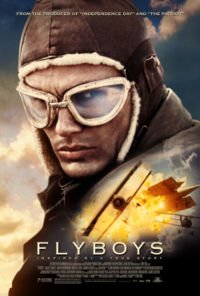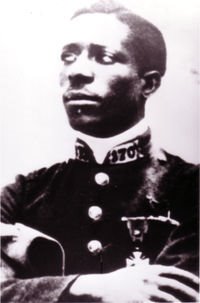Better Late Than Never
 This weekend features the release of the film "Flyboys", an action adventure film about some heroic Americans that did not wait for the rest of the nation to do what they felt was right and joined the French Air Corps to fight in WWI.
This weekend features the release of the film "Flyboys", an action adventure film about some heroic Americans that did not wait for the rest of the nation to do what they felt was right and joined the French Air Corps to fight in WWI.
I am not plugging this film because I secretly like the French or just want to be an armchair movie critic, but because the story of the black flyer Eugene Bullard depicted in this film is a true. Bullard was the first black American military pilot and although he was rejected by the U.S. Army Air Corps, he did get to fly and distinguished himself in the "Lafayette Escadrille."
I am posting the entire Wikipedia story below, which is actually a sad one, yet, in the end, I feel good that Mr. Bullard is finally getting his props in this major film account. I hope you will support it and honor the memory of Eugene Bullard.
------------------
Eugene Bullard
From Wikipedia, the free encyclopediahttp://en.wikipedia.org/wiki/Eugene_Bullard
Eugene Bullard (9 October 1895 – 12 October 1961) was the first Black military pilot.
He was born Eugene Jacques Bullard in Columbus, Georgia, in the United States. His father was known as "Big Chief Ox" and his mother was a Creek Indian; together, they had ten children. Bullard stowed away on a ship bound for Scotland to escape racial discrimination (he later claimed to have had witnessed his father's narrow escape from lynching as a child).
While in the United Kingdom he worked as a boxer and also worked in music hall. On a trip to Paris he decided to stay and joined the French Foreign Legion upon the outbreak of World War I in 1914. Wounded in the 1916 battles around Verdun, and already awarded the Croix de Guerre, Bullard transferred to the Lafayette Flying Corps in the French Aéronautique Militaire and was eventually assigned to 93 Spad Squadron on 17 August 1917, were he flew some twenty missions and is thought to have shot down two enemy aircraft.
With the entry of the United States into the war the US Army Air Service convened a medical board in August 1917 for the purpose of recruiting Americans serving in the Lafayette Flying Corps. Although he passed the medical examination, Bullard was not accepted into American service because Blacks were barred from flying in US service at that time. Bullard was discharged from the French Air Force after getting into a fight with an officer while off duty and was transferred back to the French infantry in January 1918, where he served until the Armistice.
Following the end of the war, Bullard remained in Paris. He began working in nightclubs and eventually owned his own. He married the daughter of a French countess but the marriage soon ended in divorce, with Bullard taking custody of their two daughters. His work in nightclubs brought him many famous friends, among them Josephine Baker, Louis Armstrong, and Langston Hughes. At the outbreak of World War II, in 1939 Bullard (who spoke German), readily agreed to a request from the French to spy on German agents frequenting his club in Paris.
After the German breakthrough and invasion of the French Third Republic in 1940, Bullard took his daughters and fled south, out of Paris. In Orléans he joined a group of soldiers defending the city and suffered a spinal wound in the fighting. He was helped to flee to Spain by a French spy and in July 1940 he returned to the United States.
Bullard spent some time in a hospital in New York for his spinal injury, but he would never fully recover. During and after World War II, when seeking work in the United States, he found that the fame he enjoyed in France had not followed him to New York. He worked in a variety of occupations, as a perfume salesman, a security guard, and as interpreter for Louis Armstrong, but his back injury severely restricted what he was able to do. For a time he attempted to regain his nightclub in Paris, but his property had been destroyed during the Nazi occupation, and he settled for a financial settlement from the French government which allowed him to purchase an apartment in New York’s Harlem district.
In the 1950s, Bullard was a relative stranger in his own homeland. His daughters had married, and he lived alone in his Harlem apartment, which was decorated with pictures of the famous people he had known, and with a framed case containing his 15 French war medals. His final job was as an elevator operator at the Rockefeller Center, where his fame as the “Black Swallow of Death” was unknown.
In 1954, the French government invited Bullard to Paris to rekindle (together with two Frenchmen) the everlasting flame at the Tomb of the Unknown Soldier under the Arc de Triomphe and in 1959 he was made a chevalier (knight) of the Légion d'honneur. Even so, the last years of his life were spent in relative obscurity and poverty in New York City where he died of stomach cancer on October 12, 1961. He was buried with honors by French War Officers in the French War Veteran's section of the Flushing Cemetery in the New York City borough of Queens. In 1972, his exploits as a pilot were put in print with the book The Black Swallow of Death.
On 23 August 1994, thirty-three years after his death, and seventy-seven years to the day after his rejection for U.S. military service in 1917, Eugene Bullard was posthumously commissioned as a Second Lieutenant in the United States Air Force.





1 Comments:
I first read the story of Eugene Bullard when I was a young soldier stationed in "West" Berlin in 1967. I was looking through a copy of Ebony magazine. I was mesmerized by this story. Today I have retired from the US Army(22 years), spent 10 years as a cop, and currently live in the Dominican Republic while continuing my profession as a International Private Investigator. I continue to be mesmerized by this mans history. I have a picture of him in my office. I have purchased and read "Black Swallow of Death"(many years ago), and just found about the movie Flyboys today. I often wonder why producers and directors like John Singletary and Spike Lee have never produced and started a movie centered entirely on the man. His fly days were only a part of the extra ordinary life he lived.
The biggest hero in my life, is Eugene Bullard.
When he encountered discrimination, he did something about it. He left the country and attempted to live a decent life in a better world.
In closing I would like to say that in 1969 I was transfered from Berlin to Holland where I was assigned to AFCENT in Masstricht Netherlands. I used to jump into my sports car and drive across Belgium and into France. When I got to Paris I would go to Pig Alle section and drank and party. At one point this was almost every weekend. And in those days I tried to get the flavor of the Parisian nightlife and what he lived through
But in reality, no one can do that, because there was only one Eugene Bullard.
Charles Williams
Telstar Investigations Inc.
license id# 11-2414(VA)
section25@msn.com
http://pages.prodigy.net/trakker454/
Post a Comment
<< Home